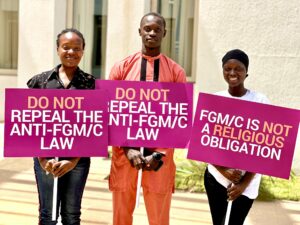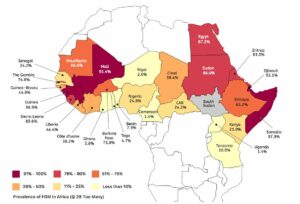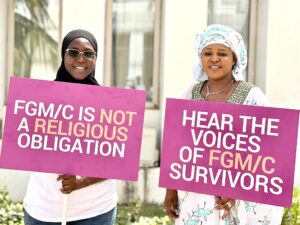This week, on March 4, the National Assembly of The Gambia held its first sitting for the legislative year 2024. Almameh Gibba, Foni Kansala representative, tabled a bill that seeks to repeal the Anti-Female Genital Mutilation(FGM) protections under the Women’s (Amendment) Act 2015. In December 2015, towards the end of Yahya Jammeh’s dictatorship, the Women’s Act 2010 was amended to provide for eliminating harmful traditional practices by the National Assembly
Gibba argued that FGM is deeply rooted in culture, using religious purity in Islam as a base. A prominent Imam Abdoulie Fatty, President Jammeh’s former close religious adviser and other religious conservatives have backed Gibba. The Friday before the bill tabling, Fatty gave a sermon pronouncing that “if the anti-FGM law is not repealed, they will start giving out girls as young girls as thirteen years in marriage.” Another twisted attempt to frame FGM as a practice that protects girls from early marriage.
When the Honourable Gibba was called to present his bill in the National Assembly, there was an uproar of rejection. Staunch and progressive voices pushed back, saying, “Bill out,” giving a glimpse of hope. Seedy Njie, the Deputy Speaker of the National Assembly, has shown a commitment and hopes the bill will be defeated.

On March 18, the bill will return for hearing and voting on whether to repeal or maintain the anti-FGM law. Before the voting, civil society, NGOs, and members of the public will have a chance to speak about the bill, and women’s rights advocates have been working hard against the growing tide of religious pushback.
What was not surprising at the national assembly premises were girls and young women believed to be mobilised from Madrasas (Islamic learning centres) all over the country answering the call by Imam Fatty with flyers chanting “FGM does not exist in The Gambia” and “Allahu Akbar” (God is great in Arabic). They want to make it seem as if this is even a fight against religion or that national legislation should follow narrow, skewed interpretations of one religion by an Imam who supported and upheld a bloodletting dictatorship.
FGM is a culture of violence against women
The supporters of the bill claim that the type of FGM practiced in The Gambia is not or cannot be classified as mutilation. However, the reality is that all types of cutting have been practiced in The Gambia, the most common being type two FGM. Most of the young women ferried to the National Assembly are raised in the most authoritative form of patriarchal setting, with no autonomy; therefore, they are not even allowed to have agency over their being. While many may not fully grasp the effects of FGM, their presence at the national assembly is part of a well-orchestrated effort to take away the protections of women and girls by fronting this one group.

As civil society and activists, we have run our campaigns from generation to generation. Currently, the #EndFGM220 is critical to ensuring more young women get their rights and determine what to do with their bodies, not societies or religious leaders. We continue to speak with a single voice to achieve justice for survivors and to protect the future generation of women from abuse.
Feminist organisations and civil society continue to engage communities and ensure survivors are at the centre, reaching out to community leaders and several members of the National Assembly to build solidarity. We have seen critical meetings with the Executive, ministries and judiciary to promote human rights and the rule of law as stipulated in The Gambian constitution and international human rights instruments.

Former Vice President and founder of the Gambia Committee on Traditional Practices (GAMCOTRAP) Dr. Isatou Touray, in a message on February 06 on International Day of Zero Tolerance for Female Genital Mutilation, emphasised:
“We have a very large constituency of young organizations, youth, and individuals who are also there to raise their voices…have come together and then called on the international feminist movement.
We are being threatened. We have to try to maintain the gains that we have made, consolidate them, and then look for further rights by making sure that the young generation is brought up, encouraged, trained, and let them speak for themselves, let their voices be heard.”
Now more than ever, we need sustained investments and resources in the work of community leaders and activists to educate the population and dispel persistent harmful norms and practices like FGM toward a secure future for Gambian children and women. We cannot defeat this regression in our small corners. The assault on the human rights of girls and women in The Gambia, if excused, emboldens the work of anti-democratic forces that our countries must push back against.
Feature photo by Network Against GBV Gambia @NgbvTheGambia
 Matida Kebbeh is a feminist leader and storyteller from The Gambia. Her expertise is in advocacy and movement building around economic and social justice. Matida volunteers with various young women lead organizations focused on ending child marriage, FGM, and other traditional harmful practices. She’s currently the finance Associate at Equals Now.
Matida Kebbeh is a feminist leader and storyteller from The Gambia. Her expertise is in advocacy and movement building around economic and social justice. Matida volunteers with various young women lead organizations focused on ending child marriage, FGM, and other traditional harmful practices. She’s currently the finance Associate at Equals Now.
